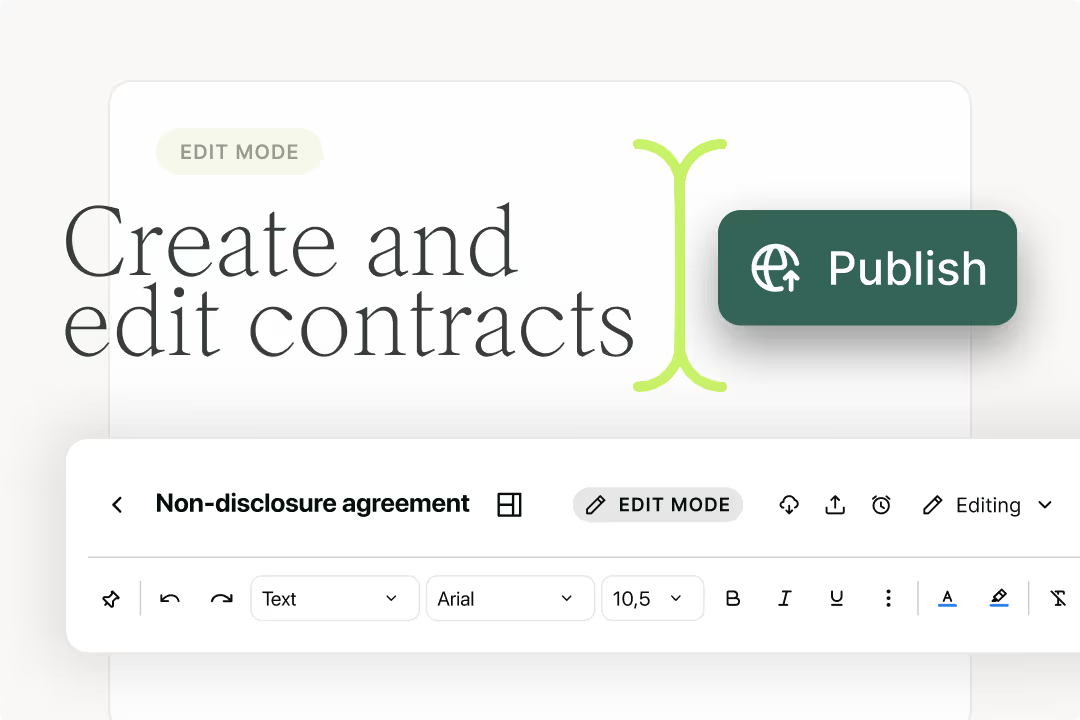Solutions
Customer Support
Resources
A time and materials contract is generally used in the construction industry to outline the timeframe and materials that are needed to complete a project.
Often, these contracts are based on estimates and they should be viewed as a guideline, as opposed to set in stone. These are complex contracts with many moving parts, meaning they require strong contract management to be successful.
This software can help you automate this process, from creating a contract template to an in-depth analysis of key contract metrics.
Keep reading to find out what a time and materials contract is, when you should use them and how to effectively manage them using contracting software.
A time and materials (T&M) contract is a legal agreement that outlines the relationship between how a client pays for a contractor’s time and the money the contractor spends on materials. This type of contract is commonly used in the construction industry.
Typically, one party pays a contractor for the costs of all materials needed to complete the job alongside an established hourly wage for the work. The contract will likely also include any fees related to the service provided. This guarantees that the contractor will be paid for expenses, as well as their labor.
In addition, a T&M contract will usually include an estimated timeframe and material list for work to be completed. This is not set in stone however and the client should be aware that costs could end up higher when the project is completed.

Contractors use time and materials contracts to ensure they are paid in full for their services. In contrast to a fixed-price contract, which establishes a set price for the delivery of goods and services, a T&M contract plans for any changes that could happen.
This means that it outlines what the customer can expect in terms of cost while making it clear that this is subject to changes. These changes could be around the cost of materials, timeframe or just the practical requirements to complete the work needed.
For the contractor, this type of agreement gives them confidence that they will be paid in full regardless of any issues with supplies, materials or workforce.
For the customer, it simplifies negotiation and sets boundaries, as an agreed fair rate of pay for the work performed is predetermined. This is an important distinction, as the purpose of any contract is to provide clarity for parties and to create boundaries within a business relationship.
This type of contract should be used when the extent of the job cannot be determined before the work itself begins. This often happens in the construction industry, as so many factors are beyond the control of the contractor, like the cost of materials when work begins.
However,, this could also occur in other industries. For example, a T&M contract may be used by software or other product creation businesses. Normally when the economic conditions are too unstable to rely on a fixed-price contract. A T&M contract ensures you are paid for the exact cost of both your labor and materials used.
Time and materials contracts are complex with lots of moving parts, here’s what should be included:

Some more common contract clauses that you could include are:
Time and materials contracts exist to provide greater clarity for both parties, but they certainly aren’t without fault. Like most types of contracts, T&M agreements have their advantages and disadvantages.
For the contractor, some advantages of a time and materials contract include:
While the advantages for the client could be:
For the contractor, the disadvantages of a T&M contract may be:
Disadvantages of this contract type for the client include:
Once you’ve decided that the pros outweigh the cons when it comes to using a time and materials contract, it's time to create one. The best place to start is by creating a standard form agreement template using contract management software.
This document should outline the basics and can be used as a starting point for most of your time and materials contracts. This template can be pre-approved by your legal team and populated with drag-and-drop fields ready to fill in with contract-specific details.
Best practice means this template can also be modified in line with an individual project or to meet the requirements of a particular client.
Using contract management software to aid with template creation is only the first step. It can also help with the entire contract process, from handling complex contract negotiations to contract storage. Streamlining this process can save your business a good deal of time and money.
Let’s take a look at what this process might look like in more detail.
As with all contracts, time and materials contracts need to be managed properly to reduce risk and avoid legal repercussions.
Luckily, time and materials contracts are a standardized contract type, making them easy to manage using a tool like Juro.

As suggested above, the first step is for your legal team to create automated contract templates for commercial teams to self-serve from.
Templates can be populated within seconds using either a natural language Q&A workflow, or by pulling data directly into the contract smartfields from a customer relationship management tool like Salesforce or Pipedrive.
Notably, this minimises the need for lean legal teams to spend their time on low-value work like contract authoring for standard agreements.

For higher-value time and materials contracts, you may want to consider setting up some contract approval workflows. With Juro, users can set up approval workflows manually for each contract or automate this process using conditional logic rules.
Put simply, if you decide that higher-value contracts carry a lower level of risk if they receive approval from certain stakeholders, this can be built in at the template level. So if a time and materials contract is created using this template, and it has a value over a set threshold, the contract will automatically require approval before it can progress to the next stage of the contract lifecycle.
This helps to ensure that your time and materials contracts are watertight, and it enables you to reduce contract risk.

There are so many moving parts in a time and materials contract, that it often requires a large degree of contract negotiation before reaching signature.
In a manual contract workflow, this is a time-consuming process as contracts move back and forth between various platforms such as Word and email. This process is then repeated every single time a change is made until both parties reach an agreement on the terms included.
Again, this process is made simpler when using a CLM like Juro, as users can negotiate contracts without ever needing to leave the platform. Automated workflows mean users can share the contract with the counterparties and add redlines directly into the dynamic contract version.

Time and materials contracts don’t require a wet ink signature and would benefit from users adopting electronic signatures. Juro’s built-in eSignature functionality empowers legal and commercial teams to sign contracts in the same platform they were created.
This feature also works on a wide range of devices, which is particularly relevant for contractors who are regularly on-site and likely to be signing contracts on the move.
Managing time and materials contracts doesn’t end once they’re signed, in fact, they’ve only just started. As these contacts are changeable, you need to be on top of monitoring your contractual obligations to ensure contract compliance.
It may sound obvious, but many businesses find themselves in a tight spot as a result of low contract visibility - usually, these contracts are buried in shared drives (or worse, actual filing cabinets).
Fortunately, Juro enables users to monitor their contracts with ease. Users can search through hundreds of contracts for certain words, phrases, numbers and characters within seconds.

Juro’s intelligent contract automation platform enables all teams to streamline the creation, execution and management of routine contracts at scale.
To find out more about how Juro can make managing time and materials contracts frictionless for your business, request a demo via the form below.
Lorem ipsum dolor sit amet, consectetur adipiscing elit. Suspendisse varius enim in eros elementum tristique. Duis cursus, mi quis viverra ornare, eros dolor interdum nulla, ut commodo diam libero vitae erat. Aenean faucibus nibh et justo cursus id rutrum lorem imperdiet. Nunc ut sem vitae risus tristique posuere.

